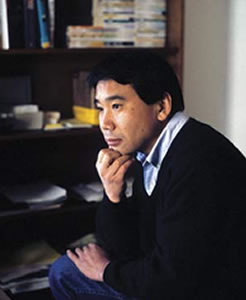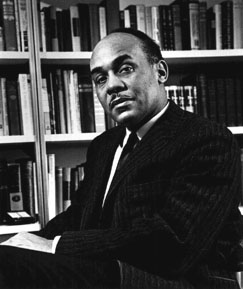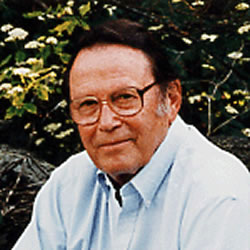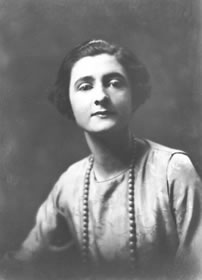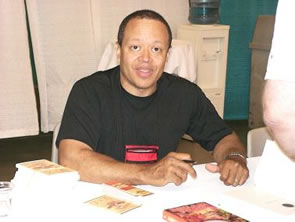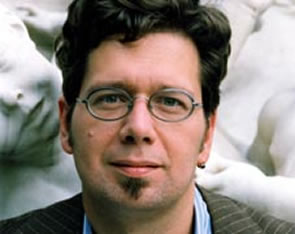De Nederlandse dichter, schrijver en columnist Cees van der Pluijm werd geboren op 12 januari 1954 te Radio Kootwijk (Gld.). Zie ook mijn blog van 12 januari 2007 en ook mijn blog van 12 januari 2008.
Uit: Sonsbeeksonnetten
HET PAVILJOEN
Een warme zomeravond, als het meezit
Hoort wie goed luistert verre echo’s klinken:
Beschaafde zang, orkestmuziek, gerinkel
Van glazen, fluisterstemmen in de nacht
Geen schlagers of de laatste Doris-Day-hit
Maar wel weemoedig koper; kijk: ze drinken
Champagnewijn waarin het speels getwinkel
Van maan en kaarslicht dreigend leed verzacht
Geen tekens van geweld nog, slechts geruis
Van zomerjurken, schuldeloos vermaak
Maar dan: je knippert en het is voorbij
Wat rest: het hedendaags verkeersgesuis
Een populaire wok- en afhaalzaak
Geen schim meer van de oude schenkerij
Uit: Portretsonnetten
1
Van borst tot buik een strakke rechte lijn
Slechts rib of tepel bieden wat reliëf
Een lichaam zonder angst of schuldbesef
Ik ben hem zelf, ik ben hem eens geweest
Hij is nu zoals ik misschien wel was
Beloftevol, maar verder groen als gras
Een beetje engel en een beetje beest
Blondborstig zit hij in dezelfde trein
Een tors, met haartjes haast onzichtbaar nog
Een aaibaar en toch onaanraakbaar joch
Ik kijk naar buiten, quasi onbespied
Hij ziet mij aan, hij kijkt, verraadt zich niet
Lijkt opgelucht en blij, maar blij het meest:
Zo blij dat hij nog mij niet hoeft te zijn
12
Haast niemand die van meer belang voor mij is
Die machtiger en krachtiger dan hij is
Zo prachtig met zijn lange blonde haren
Zijn geest die ongebonden, sterk en vrij is
Ik kan soms uren naar zijn aanblik staren
Dan voel ik dat hij meer dan zeer nabij is
En zo passeren dagen, maanden, jaren
Van hartstocht, passie, niet te evenaren
Ik heb hem vaak naast mij in bed gelegd
Hoewel dat volgens velen slecht en fout is
Hoe fel brandt onze liefde, hoe oprecht
Terwijl het in de wereld om ons koud is
En hoe betreur ik dat zijn kruis van hout is
Maar ja, hij is er nogal aan gehecht
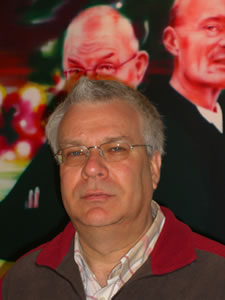
Cees van der Pluijm (Radio Kootwijk, 12 januari 1954)
De Nederlandse dichter en schrijver Jacques Hamelink werd geboren op 12 januari 1939 in Driewegen, bij Terneuzen. Zie ook mijn blog van 12 januari 2007 en ook mijn blog van 12 januari 2008.
Betrekkende mens
Langzaam neemt de mens
de schutkleur aan
van de aarde
die hem in steeds trager
welsprekende velden
en wegen van wolken betrekt
en ook de blaasbalg lucht
zijn piepend draaiorgel geworden
dan alom bekroond
met koude honger
met poriën voor regen en slaap
zijn ereteken zijn schamperste vuurslag
voldoende om de sterren ruwweg te ontbinden
verbergt hij taal en teken
in landschappen
die savonds dichtklappen
als een deur.
Werkelijk
Werkelijk,
men moest de steen
met menselijke waardigheid
bekleden, zijn woord
voor menswaardig
aannemen.
Men moest, om nog
in de mens
te kunnen geloven, zijn oor
te luister leggen
bij de steen of met de stem
spreken
van een steen.
Men moest,
om de eerste de beste
steen te citeren,
uit de steenrots een geheel
nieuwe mens
slaan.

Jacques Hamelink (Terneuzen, 12 januari 1939)
De Japanse schrijver en vertaler Haruki Murakami werd geboren op 12 januari 1949 in Kioto. Zie ook mijn blog van 1 maart 2007 en ook mijn blog van 12 januari 2008.
Uit: After Dark Vertaald door Jay Rubin)
„Eyes mark the shape of the city.
Through the eyes of a high-flying night bird, we take in the scene from midair. In our broad sweep, the city looks like a single gigantic creature—or more like a single collective entity created by many intertwining organisms. Countless arteries stretch to the ends of its elusive body, circulating a continuous supply of fresh blood cells, sending out new data and collecting the old, sending out new consumables and collecting the old, sending out new contradictions and collecting the old. To the rhythm of its pulsing, all parts of the body flicker and flare up and squirm. Midnight is approaching, and while the peak of activity has passed, the basal metabolism that maintains life continues undiminished, producing the basso continuo of the city’s moan, a monotonous sound that neither rises nor falls but is pregnant with foreboding.
Our line of sight chooses an area of concentrated brightness and, focusing there, silently descends to it—a sea of neon colors. They call this place an “amusement district.” The giant digital screens fastened to the sides of buildings fall silent as midnight approaches, but loudspeakers on storefronts keep pumping out exaggerated hip-hop bass lines. A large game center crammed with young people; wild electronic sounds; a group of college students spilling out from a bar; teenage girls with brilliant bleached hair, healthy legs thrusting out from micromini skirts; dark-suited men racing across diagonal crosswalks for the last trains to the suburbs. Even at this hour, the karaoke club pitchmen keep shouting for customers. A flashy black station wagon drifts down the street as if taking stock of the district through its black-tinted windows. The car looks like a deep-sea creature with specialized skin and organs. Two young policemen patrol the street with tense expressions, but no one seems to notice them. The district plays by its own rules at a time like this. The season is late autumn. No wind is blowing, but the air carries a chill. The date is just about to change.“

Haruki Murakami (Kioto, 12 januari 1949)
De Nederlandse dichter, schrijver en schilder Alain Teister (eig. Jacob Martinus Boersma werd geboren in Amsterdam op 12 januari 1932. Teister debuteerde in 1964 met de poëziebundel De huisgod spreekt. Daarna volgden nog diverse romans en poëziebundels. Zijn ‘Zevenluik met bed en bezoekers’, een installatie met bed, paspoppen, stoel, hout en verf’ (1973-1974) werd aangekocht door het Centraal Museum Utrecht en de Rijksdienst voor Beeldende Kunsten. Hij was voorts de drijvende kracht achter de oprichting in 1975 van Theater de Engelenbak, een professioneel theater uitsluitend gericht op amateurvoorstellingen.
Toekomst
Als die mij nogal lief zijn
– vrouw, bomen, vrienden – van mij heen zijn
wil ik een snaterende grijsaard worden,
wonend op het Maliebaan-station
en in de zon.
Gekleed in conducteurscostuum
van Engels laken
een goede indruk voor de spiegel maken,
en zachtjes krijsen op het zoveelste perron:
‘honnepon,
honnepon …’
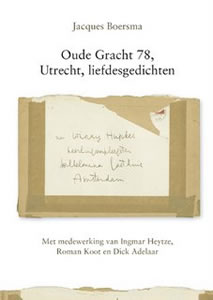
Alain Teister (12 januari 1932 – 6 februari 1979)
Boekomslag (Geen portret beschikbaar)
De Duitse dichter en schrijver Jakob Michael Reinhold Lenz werd geboren op 12 januari 1751 in Seßwegen. Zie ook mijn blog van 12 januari 2008.
Urania
Du kennst mich nicht,
Wirst nie mich kennen
Wirst nie mich nennen
Mit Flammen im Gesicht.
Ich kenne dich
Und kann dich missen –
Ach mein Gewissen
Was peinigest du mich?
Dich missen? Nein,
Für mich geboren –
Für mich verloren?
Bei Gott es kann nicht sein.
Sei hoch dein Freund
Und groß und teuer –
Doch ist er treuer
Als dieser, der hier weint?
Und dir mißfällt – –
O Nachtgedanken!!
Kenn ihn, den Kranken,
Sein Herz ist eine Welt.
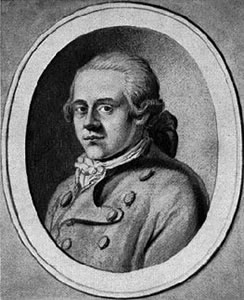
Jakob Michael Reinhold Lenz (12 januari 1751- 24 mei 1792)
De Duitse schrijver, schilder en componist Florian Havemann werd geboren op 12 januari 1952 in Oost-Berlijn. Hij is een zoon van de bekende DDR-criticus Robert Havemann. In 1971 vluchtte hij naar het westen. Wolf Biermann, die zelf toen nog zijn uitburgering probeerde te voorkomen, schreef naar aanleiding daarvan het lied Enfant perdu, waarin hij de vlucht bekritiseert. Havemann studeerde in West-Berlijn vervolgens Scenografie aan de Hochschule der Künste. Hij schreef diverse stukken voor het toneel, o.a. over Albert Speer en Rosa Luxemburg en componeerde ook muziek voor het theater. Sinds 2005 publiceert hij op het internet de Zeitschrift für unfertige Gedanken. Onder de titel Havemann schreef hij een 1100 pagina’s tekllende, zogenaamde „Tatsachenroman“ over zijn grootvader, zijn vader en zichzelf. Al voor het verschijnen leidde het werk tot controverses, o.a. omdat hij erin suggereerde dat Wolf Biermann sexuele contacten had met Margot Honecker, de vrouw van partijleider Erich Honecker. Het boek werd door de uitgeverij later uit de handel genomen en in een verkorte vorm vorig jaar opnieuw uitgebracht.
Uit: Havemann
„Havemann, das beginnt mit einem Saathändler. Für mich beginnt Havemann mit einem Saathändler, aber natürlich weiß ich, daß es vor diesem Saathändler andere Havemänner gegeben haben muß, Havemänner, von denen dieser Saathändler abstammt und mit ihm dann wir, mein Großvater,
mein Vater und ich, und natürlich auch noch die vielen anderen, die zur Sippschaft gehören. Vielleicht waren das Bauern, Saatgüterproduzenten, die sich eines Tages auf den Handel mit Saatgut allein verlegt haben, vielleicht aber waren das lange und immer schon Havemänner, to have Männer, Männer und ihre Familien, die was hatten, Besitz, vielleicht aber auch waren das Hafenmänner, diese Havemänner, und damit schon Händler von alters her, Leute, die im Hafen ankommende Ware kauft en und dann weiterverkauft en, in andere Städte, ins Hinterland.
Hamburger Hafenmänner zum Beispiel, denn die habe ich mir immer als unsere Vorfahren vorgestellt, von denen dann einer auf der halben Strekke zwischen Hamburg und Berlin hängengeblieben ist, in Grabow, der kleinen Stadt Grabow. Besser ein großer Händler sein in Grabow als ein kleiner Hafenmann in Hamburg. Besser ein to-have-Mann in einem kleinen Nest wie Grabow sein, ein Habenmann, ein Habemann dort als von der Hamburger Hafenkonkurrenz erdrückt werden – an irgendwelche Bauern, die Saatgut produzierten und dann zu Saatguthändlern wurden, habe ich nie geglaubt, denn das ist für mich nicht Havemann. Havemann, das ist für mich: eine Gelegenheit ergreifen, die sich einem bietet. Den Saatguthandel in einer kleinen Provinzstadt wie Grabow zum Beispiel.
Havemann, das ist: lieber in einem kleinen Nest ein König zu sein als sich in einer Weltstadt, in einer Hafenstadt mit Verbindung in die ganze Welt, der Konkurrenz der ganzen Welt ausgesetzt, abmühen zu müssen.
Havemann, das ist: DDR und im doofen Rest der Klügste sein zu wollen.”
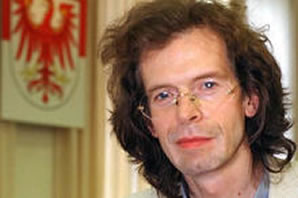
Florian Havemann (Oost-Berlijn,12 januari 1952)
De Albanese schrijver Fatos Kongoli werd geboren op 12 januari 1944 in Elbasan. In zijn kinderjaren verhuisde zijn familie naar Tirana. Hij studeerde wiskunde in Tirana, maar ook in China. Vanaf 1970 werkte hij als cultuurredacteur bij uitgeverijen, tijdschriften en kranten.
Uit: Die albanische Braut (Vertaald door Joachim Roehm)
„Natürlich wußte ich, daß Vilma im Labor arbeitete. Ich hatte sie n weißen Leinenhosen und im weißen Arbeitsmantel hinten aus er Fabrik kommen sehen, auf dem Kopf die unvermeidliche nd gleichfalls weiße Haube. Allerdings immer nur von weitem.
In der Hölle, in der ich mich bewegte, bewies mir ihre Erscheinung, aß es irgendwo noch ein anderes Leben gab als das, das ir alltäglich in Gestalt sündiger Teufel entgegentrat. Jemand, er von solch unglückseligen Bevölkerern der Hölle umgeben ar, konnte nicht anders, als ein paradiesisches Wesen in ihr u sehen. Darauf war es wahrscheinlich auch zurückzuführen, aß ich meinte, das Reich der Schatten in Richtung Garten den zu verlassen, als Dori einen ehemaligen Studenten der industriellen
Chemie im dritten Semester für geeignet hielt, den latz der jählings entführten Laborantin zu besetzen. In Wahrheit andelte es sich dabei um einen absolut gewöhnlichen aum mit absolut gewöhnlichen Geräten, in dem Tag und Nacht in ohrenbetäubender Lärm herrschte. Von einem Paradies war
wirklich nichts zu spüren. Die einzige Veränderung in meinem eben war die, daß ich auf meinem Weg ins Labor keine in Zeitungspapier ingewickelte Pausenzehrung bei mir führte. Und aß ich nicht mehr mit Teufeln zu tun hatte, sondern den Tag n Gesellschaft zweier von Kopf bis Fuß in Weiß gehüllter Wesen erbrachte. Eines davon war Vilma.
Das gütige Geschick führte mich in Vilmas Labor auf dem mweg über ein Büro, in dem es weder Staub noch Lärm gab.
Es war darin weder besonders hell noch besonders dunkel, und as einzige Fenster war vergittert. Wollte man hineingelangen, ußte man erst an einer mit emailliertem Blech beschlagenen
Tür anklopfen. Wenn man sie dann öffnete, stand man verdutzt or einem Käfig: von einer Wand zur anderen erstreckte sich in deckenhohes Eisengitter. Es war, als würde man eine Gefängniszelle
betreten. Doch es handelte sich um kein Verlies, ondern um das Kaderbüro. In dem eisernen Käfig saß zwischen egalen und Tresoren ein Mensch.“

Fatos Kongoli (Elbasan, 12 januari 1944)
De Britse schrijver William Nicholson werd geboren op 12 januari 1948 in Tunbridge Wells, Kent. Hij bezocht de Downside School, Somerset, en Christ’s College, Cambridge. Zijn vrouw Virginia is eveneens schrijfster en kan beroemde voorgangsters als Vanessa Bell en Virginia Woolf tot haar familie rekenen. Nicholson werkte jarenlang voor de BBC en maakte documentaire films. Hij werd bekend als schrijver toen het eerste deel van zijn Wind On Fire trilogie hem de Blue Peter best book award opleverde in 2000.
Uit: The Society of Others
„On this random day from all that time ago, longer ago than yesterday, I’msitting alone in my room, the blind down over the window and the door locked.There’s music playing to which I am not listening. The television is on, with nosound. I’m not watching. It’s just there like the crack of light on thewindowsill and the pressure in my bladder that tells me I need to piss. MaybeI’ll go soon. I’m doing nothing in particular. I do nothing most days. You couldsay it’s what I do, like it’s my occupation. This is not a problem. I don’t wantanything. I have the animal needs like you do, to eat and excrete, to mate andto sleep, but as soon as the needs are met they go away, and everything’s theway it was before. That stuff is necessary. We’re not talking desire.
I don’t even want money. What’s the point? You see something you want to buy,you get excited about having it, you buy it, the excitement fades. Everything’sthe way it was before. I’ve seen through that game. They make you want things sothey get your money. Then they take your money and then they’ve got it, and whatdo they do? They use it to buy things someone else has made them want. For a fewmoments they think they’re happy, and then it all fades and everything’s the wayit was before. How stupid can you get? It’s like fish. Fish swim about all dayfinding food to give them energy to swim about all day. It makes me laugh. Thesepeople who hurry about all day making money to sell each other things. Anyonewith eyes to see could tell them their lives are meaningless and they aren’tgetting any happier.“
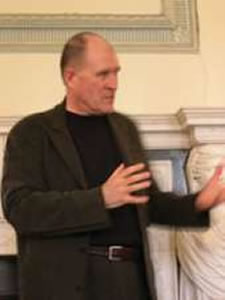
William Nicholson (Tunbridge Wells,12 januari 1948)
De Hongaarse schrijver Ferenc Molnár werd op 12 januari 1878 in een burgerlijk-joods gezin van Duitse afkomst geboren. Tussen 1887 en 1895 bezocht hij het Gereformeerde Gymnasium in Boedapest. In 1895 studeerde hij rechten in Boedapest en Genf en daarna ging hij naar Parijs. In 1896 kwam hij terug naar Boedapest, maar voltooide zijn studie niet. Zijn eerste verhaalbundel is in 1898 verschenen. Zijn eerste roman kwam in 1901 uit en zijn eerste drama werd in 1902 opgevoerd. Zijn hele leven leefde Molnar onder bijzonder goede omstandigheden. Hij werd heel snel de meest populaire Hongaarse (toneel)schrijver. Zijn werken werden in veel talen vertaald en in de hele wereld opgevoerd. Zijn artistieke en persoonlijke beoordeling zijn echter tegenstrijdig, zelfs extreem verschillend. In 1906 werd hij tot mederedacteur van de krant Budapesti Napló gekozen. Zijn snelle succes bracht de klassieke jeugdroman A Pál utcai fiúk (De jongens van de Paulstraat) (1907) die in veertien talen vertaald en in meerdere landen verfilmd werd. Dit boek is ook tegenwoordig bijzonder populair. Het succes werd bekroond door de toneelstukken Liliom en A testõr (1910).
Uit: A Matter Of Husbands (Vertaald door Benjamin Glazer)
„ FAMOUS ACTRESS: You wished to see me?
EARNEST YOUNG WOMAN: [She gulps emotionally] Yes.
FAMOUS ACTRESS: What can I do for you?
EARNEST YOUNG WOMAN: [Extends her arms in a beseeching gesture] Give me back my husband!
FAMOUS ACTRESS: Give you back your husband!
EARNEST YOUNG WOMAN: Yes. [The FAMOUS ACTRESS only stares at her in speechless bewilderment.] You are wondering which one he is…. He is a blond man, not very tall, wears spectacles. He is a lawyer, your manager’s lawyer. Alfred is his first name.
FAMOUS ACTRESS: Oh! I have met him–yes.
EARNEST YOUNG WOMAN: I know you have. I implore you, give him back to me.
[There is a long pause.]
FAMOUS ACTRESS: You mustn’t mistake my silence for embarrassment. I am at a loss because–I don’t quite see how I can give you back your husband when I haven’t got him to give.
EARNEST YOUNG WOMAN: You just admitted that you knew him.
FAMOUS ACTRESS: That scarcely implies that I have taken him from you. Of course I know him. He drew u
p my last contract. And it seems to me I have seen him once or twice since then–backstage. A rather nice-spoken, fair-haired man. Did you say he wore spectacles?
EARNEST YOUNG WOMAN: Yes.
FAMOUS ACTRESS: I don’t remember him with spectacles.
EARNEST YOUNG WOMAN: He probably took them off. He wanted to look his best to you. He is in love with you. He never takes them off when I’m around. He doesn’t care how he looks when I’m around. He doesn’t love me. I implore you, give him back to me!“
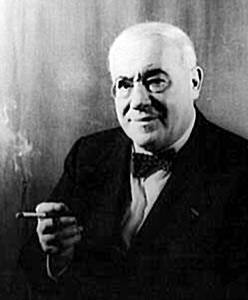
Ferenc Molnár (12 januari 1878 – 1 april 1952)
De Amerikaanse schrijver Jack London (eig. John Griffith Chaney) werd geboren op 12 januari 1876 in San Francisco, Californië. Al vanaf zijn jonge jaren had hij het moeilijk om rond te komen. Hij nam allerlei baantjes aan. In 1893 kreeg hij een gevangenisstraf voor landloperij. Daarna – hij was toen 17 – besloot hij alsnog een opleiding te volgen. Met succes, in een jaar, rondde hij een programma af dat normaal 6 jaar duurde. Een universiteitsopleiding maakte hij niet af omdat hij deelnam aan de Alaska goldrush. In Alaska begon hij met schrijven. Boeken als ‘The Call of the Wild’ (Roep van de Wildernis), ‘White Fang’ (Witte Hoektand) en ‘Martin Eden’ maaktem hem wereldberoemd.
Uit: The Call of the Wild
“But his strength ebbed, his eyes glazed, and he knew nothing when the train was flagged and the two men threw him into the baggage car.
The next he knew, he was dimly aware that his tongue was hurting and that he was being jolted along in some kind of a conveyance. The hoarse shriek of a locomotive whistling a crossing told him where he was. He had travelled too often with the Judge not to know the sensation of riding in a baggage car. He opened his eyes, and into them came the unbridled anger of a kidnapped king. The man sprang for his throat, but Buck was too quick for him. His jaws closed on the hand, nor did they relax till his senses were choked out of him once more.
“Yep, has fits,” the man said, hiding his mangled hand from the baggageman, who had been attracted by the sounds of struggle. “I’m takin’ ‘m up for the boss to ‘Frisco. A crack dog-doctor there thinks that he can cure ‘m.”
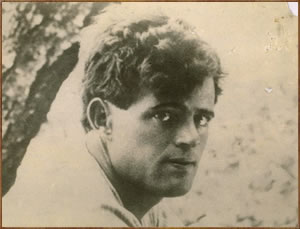
Jack London (12 januari 1876 – 22 november 1916)
De Franse schrijver Charles Perrault werd geboren op 12 januari 1628 in Parijs uit een rijke familie. Zie ook mijn blog van 12 januari 2008.
Uit: Le chat botté (De gelaarsde kat)
„Un meunier ne laissa pour tous biens à trois enfants qu’il avait, que son moulin, son âne et son chat. Les partages furent bientôt faits, ni le notaire, ni le procureur n’y furent point appelés. Ils auraient eu bientôt mangé tout le pauvre patrimoine. L’aîné eut le moulin, le second eut l’âne, et le plus jeune n’eut que le chat. Ce dernier ne pouvait se consoler d’avoir un si pauvre lot :
-“Mes frères, disait-il, pourront gagner leur vie honnêtement en se mettant ensemble; quant à moi, lorsque j’aurai mangé mon chat, et que je me serai fait un manchon de sa peau, il faudra que je meure de faim.”
Le chat qui entendait ce discours, mais qui n’en fit pas semblant, lui dit d’un air posé et sérieux :
-“Ne vous affligez point, mon maître, vous n’avez qu’à me donner un sac, et me faire faire une paire de bottes pour aller dans les broussailles, et vous verrez que vous n’êtes pas si mal partagé que vous croyez.”
Quoique le maître du chat n’y croyait guère, il lui avait vu faire tant de tours de souplesse, pour prendre des rats et des souris, comme quand il se pendait par les pieds, ou qu’il se cachait dans la farine pour faire le mort, qu’il ne désespéra pas d’en être secouru dans sa misère.”

Charles Perrault (12 januari 1628 – 16 mei 1703)



